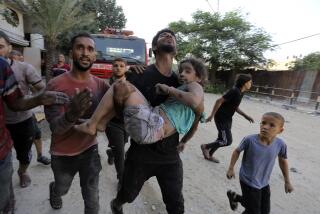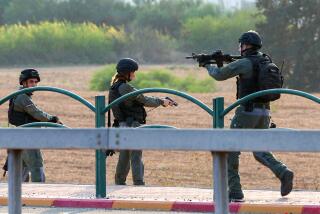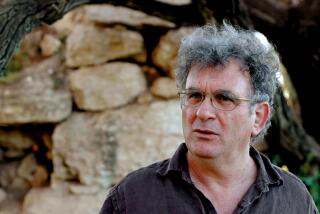For Arabs, a Cruel Echo of History
- Share via
BEIRUT — To Washington and London, this week’s attack against Iraq is part of a historical process to promote Arab peace, liberty and democracy. To most Arabs, it is a cruel reappearance of demons that have haunted them for centuries.
A small minority of Arabs -- mostly in Kuwait and other Persian Gulf states that have suffered from Iraqi attacks -- assists the United States today; the majority vehemently rejects the U.S. military as an instrument for changing Middle Eastern regimes or reshaping our political landscape.
Of course, Arabs do not speak in a single voice. My own assessment is that most Arabs see this attack against Iraq as sinister in its intent, illegitimate, unprovoked, unnecessary, counterproductive for the U.S. and destructive for the region. This comes on top of long-standing criticisms of America’s pro-Israel policies. The result is the powerful anti-American current that predominates in this region.
Most Arab world analysts and citizens believe the U.S. just wants to control Iraq’s oil, secure a permanent Mideast foothold from which to dominate and pacify the region, and redraw the region’s political map in favor of America and Israel. Steps along the way include securing permanent U.S. military bases throughout the Middle East and directly occupying and retooling a powerful Arab country.
Washington is seen as exacting the biggest of double standards: It musters, for the second time, an Anglo-American armada to enforce U.N. resolutions in Iraq, while applying no comparable political, economic or military clout to implement 50-year-old U.N. resolutions on the Israeli-Palestinian conflict or others.
Washington is further criticized for unilaterally determining which regimes to change, along with when, how, why and by whom. Many Arabs fear that a regime change in Iraq will lead to continuing instability and violence. A shakeup of power structures and ethnic/national balances may spark new power and land grabs, jockeying for supremacy and possible ethnic cleansing, especially in northern Iraq and Turkey, southern Iraq and Iran, Israeli-occupied Palestinian lands and other contested areas.
For many Arabs, this revives historical ghosts from 1915-22, when British and French armies brazenly rearranged our region into strange- shaped countries with Euro-made power structures. The Arab view is that this was done mainly to protect Western colonial interests, divide up local spoils and promote Zionist national goals, largely ignoring indigenous Arab, Kurdish and other local interests. The consequences have been catastrophic: nearly a century of chronic wars and insurrections, unstable frontiers, underachieving and distorted economies, and the most persistent modern legacy of political autocracy anywhere on the planet.
This attack on Iraq may be novel and noble for Americans, but for many Arabs it is seen as yet another return of the Western armies that have regularly marched into our lands over the last two centuries to establish a political-economic order that is unsatisfactory to most of us, or to create a new political order aiming mainly to serve the interests of the U.S., Israel or the tiny elite of Western-created Arab wielders of power and amassers of wealth.
As we watch this war on television, most of us in the Arab world see just another Arab power being sacked by another Western armada; Arab armies and rich states watching helplessly or assisting the attackers; a U.S.-backed Israel again battering Palestinians and taking more of their land; mass Arab anger and humiliation welling up, only to be suppressed by U.S.-backed Arab regimes; and a hapless U.N. and its spirit of the rule of law expediently used, then discarded, by Washington.
This is the recurring historical horror show that most Arabs see as they watch the bombing of Baghdad. This terrible and haunting saga of Arab weakness, failure, vulnerability and chronic humiliation cumulatively has led to mass degradation and dehumanization that leaves most Arabs numb in disbelief. We desperately want change, reform, democracy, prosperity and modernity, but few of us believe that this will come through the barrels of Western guns. Those guns have been firing at us for centuries, and all we have is continuing failure, perhaps now to be repeated in Iraq.
More to Read
Sign up for Essential California
The most important California stories and recommendations in your inbox every morning.
You may occasionally receive promotional content from the Los Angeles Times.












